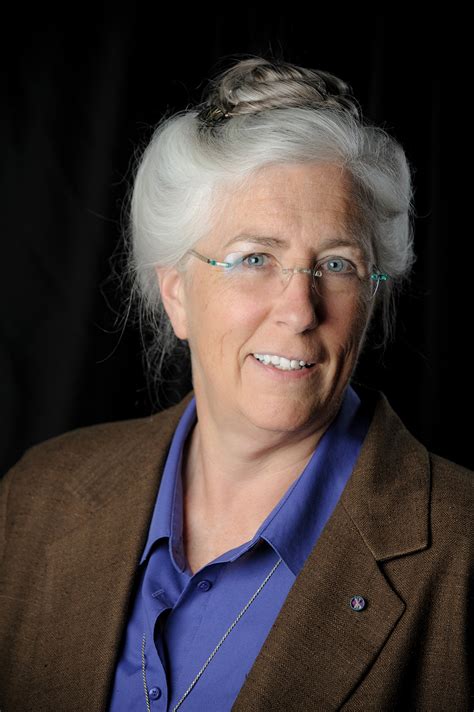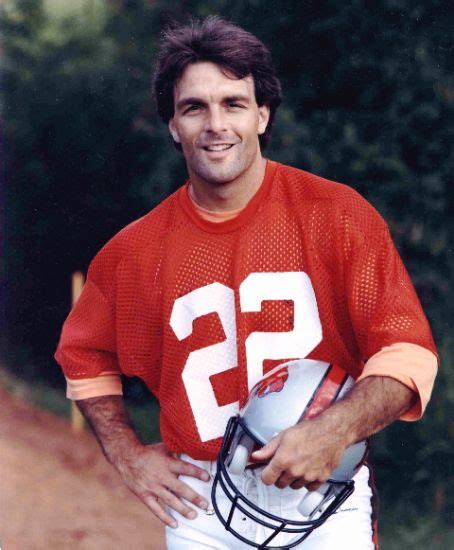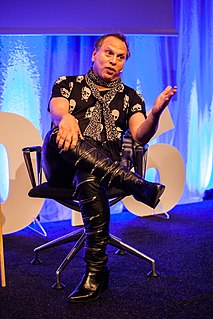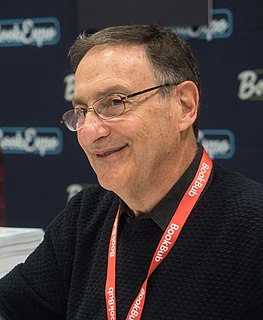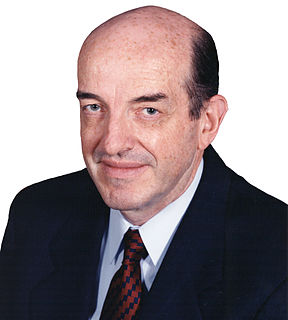Top 1200 Google Quotes & Sayings - Page 20
Explore popular Google quotes.
Last updated on April 20, 2025.
I walk out of this office every day at 5:30 so I'm home for dinner with my kids at 6, and interestingly, I've been doing that since I had kids. I did that when I was at Google, I did that here, and I would say it's not until the last year, two years, that I'm brave enough to talk about it publicly. Now I certainly wouldn't lie, but I wasn't running around giving speeches on it." "...there's no such thing as work-life balance. There's work, and there's life, and there's no balance.
Nearly half the earth's surface is unclaimed by any country, so seasteads would be startup countries on the blue frontier. Patri Friedman is a Google engineer and theorist of political economy who realized that if society floated, it would completely change the nature of governance itself. If seasteads are modular and can be moved about, allowing people to choose new societies, we'd create a market of governance providers, competing to attract residents.
Now, I'm as appreciative as the next obsessive-compulsive recovering-academic of the vast riches of material becoming available online, thanks to all those Google scanners crouched in the basements of libraries around the world, madly feeding books through their machines. I download obscure tomes onto my iPad and give thanks to the dual gods Gates and Jobs, singing hymns to all the lesser pantheon of geniuses. But there's nothing like a book.
If you're worried about messaging, people will just move to something else. You know if you legislate against Facebook and Apple and Google and whatever else in the US, they'll just use something else. So are we really safer then? I would say no. I would say we're less safe, because now we've opened up all of the infrastructure for people to go wacko at.
History shows us a lot of things. It shows why the Lord's Prayer includes the supplication: "And lead us not into temptation." In my day, dissertations were still written by hand, or drummed out with a typewriter. In the past, you had to round up the literature, find the books and find the passages. Nowadays you click on Wikipedia or Google and you have everything you need. This probably makes it more difficult to resist temptation.
Don't google your name. Ever.
Don't “search” for yourself
on anything that glows in the dark.
Don't let your beauty
be something anyone can turn off.
Don't edit your ugly out of your bio.
Let your light come from the fire.
Let your pain be the spark,
but not the timber.
Remember, you didn't come here
to write your heart out.
You came to write it in.
Facebook, when it began, like Google, was very resistant to advertising. They knew, like all - Mark Zuckerberg, like all good engineers, knew that advertising makes the product worse. But, you know, over time, they've been forced to increase the advertising load more and more and more. And the way they advertise is they - it's subtle but they know everything, you know, about everybody on the site.
I often use the iPhone as an example of how governments shape markets, because what makes the iPhone ‘smart’ and not stupid is what you can do with it. And yes, everything you can do with an iPhone was government-funded. From the Internet that allows you to surf the Web, to GPS that lets you use Google Maps, to touch screen display and even the SIRI voice activated system - all of these things were funded by Uncle Sam through the Defense Advanced Research Projects Agency (DARPA), NASA, the Navy, and even the CIA!
We are getting close to the point where as every platform of tech that has any level of scale gets bought by either Google or Facebook or sometimes Microsoft. We are getting to the point where we see some oligopoly in terms of behavior online, and that it's really problematic because the oligopolies are completely non transparent, they are terrible in terms of labor and economic equality and they support systems of surveillance. It can create a world where we are all placed in bubbles, where the systems themselves can be manipulated by people who don't have our best interests in mind.
If you're going to build something, don't build on land someone else already owns. You want your own land, your own domain, your own sovereignty. Trouble is, so much of the choice land - the land where all the people are - is already owned by someone else: By Google, Facebook, Twitter, LinkedIn, Yahoo, and Apple (in apps, anyway).
Sergey and I founded Google because we're super optimisitc about the potential for technology to make the world a better place. Think about how many people are underserved by transportation today, like those with disabilities, and how self driving cars will transform their lives. Or the wasted time you sit in your car every day commuting to and from work. Or the deaths and injuries that could be avoided.
In leading-edge companies like Google and Apple, workers are given much freedom and opportunity to play. They know that's an important component of creating new and better products. I believe that at whatever level of work, cashier at a supermarket, janitor at an airport, aide in a cubicle, the addition of a playful attitude makes the job better and the work more enjoyable. A cashier or janitor who smiles and is friendly gets a better response than a surly one.
When you think about normal advertising, it's just like, hey, here's a car and, you know, we don't know if you're looking for a car or not. So Google promised that mental state, and then were able to prove that delivering the message at the exact right moment would make someone click on something. So they pioneered the idea that advertising could be profitable on the internet, that a specific, very micromental state could be targeted. And they established the primacy of the click, which has haunted us ever since.
Now people are much more receptive because they can just go online and just Google your name and make sure you're not, you know, psycho. But, before, I think lot of opportunities were missed by a lot of girls. Also parents! The girls would go home and would say, "Oh, you know, I was just scouted." And the parents were, like, "You're not going to be a prostitute."
My wife says, "You're an idiot! Why do you Google your name and all you're doing is looking for trouble?" Because I'm thin-skinned. Because I don't like to be mischaracterized. I just don't. If someone is going to criticize what you've written and you believe in what you've written then you should respond. Now do I sometimes fall in the gutter myself and look silly doing it? Of course. Some battles I win, some battles I lose.
The different colors [of water] again refer to the fact that those little jacks, if you want to call them jacks, those little pyramids, can be packed together in all different ways. And depending on how they're packed together.If you Google blue ice, as I did just while your caller was asking his question, you see some beautiful pictures of ice covering a lake.
This intelligence, or what I'll call "the wisdom of crowds," is at work in the world in many different guises. It's the reason the Internet search engine Google can scan a billion Web pages and find the one page that has the exact piece of information you were looking for. It's the reason it's so hard to make money betting on NFL games, and it helps explain why, for the past fifteen years, a few hundred amateur traders in the middle of Iowa have done a better job of predicting election results than Gallup polls have.
You know, development sometimes is viewed as a project in which you give people things and nothing much happens, which is perfectly valid, but if you just focus on that, then you'd also have to say that venture capital is pretty stupid, too. Its hit rate is pathetic. But occasionally, you get successes, you fund a Google or something, and suddenly venture capital is vaunted as the most amazing field of all time. Our hit rate in development is better than theirs, but we should strive to make it better.
You're able to use a search engine, like Google or Bing or whatever. But those engines don't understand anything about pages that they give you; they essentially index the pages based on the words that you're searching, and then they intersect that with the words in your query, and they use some tricks to figure out which pages are more important than others. But they don't understand anything.
This is a culture of female display. And the reason it's a culture of female display is that on the Upper East Side women far outnumber men, if you do the sex ratios. I can't say exactly what they are, but you could google it. People have said two to one. So, it's a female display culture because sex ratios are skewed toward men, and they sort of have their choice, even if they're married.... Also, women are economically dependent on men, and so there's that aspect of needing to perform your beauty and your scarcity.
I think Google's founders are both a couple of guys with some high ideals which have been to some degree reflected in the way the company has been run in terms of its having a very good workplace and good employee programs, and now that they're going public they want in some ways to be able to ensure that that kind of approach continues. So they've effectively put in place this notion of "Don't Be Evil".
We really are living in an age of information overload. Google estimates that there are 300 exabytes (300 followed by 18 zeros) of human-made information in the world today. Only four years ago there were just 30 exabytes. We've created more information in the past few years than in all of human history before us.
I get to focus on something I love to do 24-hours a day rather than trying to squeeze it in between midterms, or even during my normal workday. When I was at Google it was like you wake up at 7 and then you get home by 7 and you start your second job of music. So now I get to focus all my efforts on music, travel and play shows and do all of this stuff. That's the difference - That's all my life is, all day.
People are enduring more than a temporary financial crisis. We are witnessing a fundamental shift in the economy. Companies and industries will in great measure no longer grow by borrowing vast capital to make huge acquisitions. The way to grow to critical mass - the Google way - will be to become platforms and networks that enable others to build businesses, grow, and succeed.
We have always tried to concentrate on the long term, and to place bets on technology we believe will have a significant impact over time. It's hard to imagine now, but when we started Google most people thought search was a solved problem and that there was no money to be made apart from some banner advertising. We felt the exact opposite: that search quality was very poor, and that awesome user experiences would clearly make money.
One time I had too many Heinekens and I googled myself and realized that that was a very, very bad combination. One should not google oneself. My mother lets me know when I'm being followed by paparazzi. She's like, "There's a man who is outside your house, Ginny, and you need to be logging onto this website to see if you can find a pattern in when he follows you." But otherwise, I can't find any good reason to read my own press.
I remember reading about a court case where a man tried to stab a judge with a pencil. There are Google pages full of similar instances around the world. It's obvious that the pencil lends itself to precisely that kind of use. It's not as lacking in dominance as you might think. I have an article on the fallacy of the designer intent because a lot of designers think they can design uses into technology. You can't do that. I use the pen, I make the mark, but the pen is also using me. The pen could be said to be allowing these kinds of marks. I can't do just anything with the pen.
digital hub (center of our universe) is moving from PC to cloud - PC now just another client alongside iPhone, iPad, iPod touch, ... - Apple is in danger of hanging on to old paradigm too long (innovator's dilemma) - Google and Microsoft are further along on the technology, but haven't quite figured it out yet - tie all of our products together, so we further lock customers into our ecosystem
Fifty years ago, the way that we consumed food was revolutionized. We began eating processed foods, and it seemed amazing. And then we woke up many decades later, and we realized that food was engineered to make us fat. And I think that such companies as Google, Facebook, Amazon, Apple are doing the same thing with the stuff that we ingest through our brains. They're attempting to addict us, and they're addicting us on the basis of data.
The New York Times and PBS are gatekeepers of a sort. And they perform that role of gatekeeping with a set of rules and aspirations about where they want to lead their viewers and their readers. They value objective facts, and they attempt to transmit a comprehensive view of the world. And they do have values. And they do lead their viewers and their readers to certain conclusions. But it's different than such monopolies as Apple or Google which are dissecting information into these bits and pieces, which they're then transmitting to people. And it's about clicks.
At the end of the day, customer choice is essential. And we don't make products that compete with Apple, nor make products that compete with Google. Our customers come in both iOS and Android flavors, and I hope our customers can still buy the products they want to purchase wherever they want to purchase them.
I fear that I can no longer travel without technology. Twenty years ago, I loved getting on a bus in West Africa and taking off for a city I'd never been to before, relying on advice from out-of-date travel books and fellow passengers on the bus. Now, I end up using TripAdvisor, Yelp, and Google Maps. I probably eat and sleep better when I'm on the road, but I miss the mystery of travel when it was more random and unpredictable.
The U.S. has the most advanced cyber-weaponry on the planet, and t if you look at the U.S. from the perspective of the Chinese People's Liberation Army, which runs most of its cyber activities, they look at you and they see Google and Facebook - the two largest depositories of personal data in the world - and they see the reach of the National Security Agency, which has huge digital capacity to know what is going on around the world. So the Chinese would see cyber as an un-level playing field, because the U.S. holds all sorts of advantages.
Singularity will be an opt-in scenario for human beings, especially as we draw closer to it. The more that we have the opportunity to interface with and combine ourselves with machines and machinery and electronics - those will all be opt-in moments. Would you choose to have some sort of brain implant? Would you choose to have Google Glasses installed in your eyes? It's all an approach; it's all a glide path to the moment of genuine singularity; genuine artificial intelligence.
We are at a moment that some of the Silicon Valley companies are feeling the pressure. These days the founder of Twitter apologized that his company promoted some of the things that elected Donald Trump. You don't see that much of these apologizing from Google. From Mark Zuckerberg you are hearing a little bit more of it, but he is a little more "Oh, well, this is what happens because the internet scaled up and everybody has fake news; oh, we are gonna build a better technology".
With the communication internet, whole industries have been disrupted. You're in the publishing industry, you understand that. Before, we had newspapers, magazines - now you're on the web. I'm in book publishing. I don't have to tell you what's happened to us. Television has taken a hit. The music industry. But, thousands of new businesses have emerged on this new communication revolution platform. Not just Google, Facebook, and Twitter. There are thousands of operations. Businesses that are doing the platforms, the apps. They're mining the big data. They're creating the connections.
Google's AdWords, they allow you to bid on words that people will type into the search engine, and they cost more or less. For example, I think mortgage refinancing can cost - now, it's probably hundreds, maybe thousands of dollars. So, in other words, they are allowing you to bid on what people are going to type, and that is the AdWords program. So you own certain terms, and then your ads show up as opposed to someone else's.
Innovating Women is more important today than ever. Things are changing for the better. The recent announcements by Google, LinkedIn, Yahoo, and Facebook of their diversity numbers—and a pledge to improve these—are the most recent victories. The Boys Club is under fire and is trying to reform itself. Women are achieving success and helping each other. Advancing technologies are leveling the playing field. Women are in the catbird seat for the new era of exponential innovation. This is the time to inspire and motivate—and that is what Innovating Women will surely do.
When I watch TV, and TCM isn't on, I just switch channels and look at all the information about everything. The internet is perfect for that, which is why I didn't really want to get a computer in the first place. I thought, "If I have a computer and know about this whole Google thing, I am not going to be able to sit still for a second; I'm going to think about something and then have to look it up." I have never bought myself a computer or a phone, but guys in my life have bought them for me, for whatever reason. So now I have them.
Soon it won't be the Internet any more, it'll just be like air, like somehow they'll integrate the Internet into the air. And God's name will have ended up being 'Google,' because that's the way it worked out. It could have worked out that God's name ended up being 'Yahoo,' of course, but they lost out.
Half the time, you go on any one of these news sites, whether it be a Yahoo or a Google, and one of the top headlines is always, "Did a comedian go too far?" or "Comedian offends." It's like, "Really? Comedian?" A person that's supposed to make funny and make silly and historically was the only person who was allowed to make fun of the king? We're the ones that you're taking seriously?
As the founding lead of the Google Brain team, former director of the Stanford Artificial Intelligence Laboratory, and now overall lead of Baidu's AI team of some 1,200 people, I've been privileged to nurture many of the world's leading AI groups and have built many AI products that are used by hundreds of millions of people.
I don't know how to write a novel in the world of cellphones. I don't know how to write a novel in the world of Google, in which all factual information is available to all characters. So I have to stand on my head to contrive a plot in which the characters lose their cellphone and are separated from technology.
Nefarious. This is what we get when we hire a Yale boy.” “You missed sacrosanct earlier. And taciturn and glowering,” Jack said. “What’s glowering?” “Me, apparently.” Wilkins pointed. “Now that has to be a joke.” He turned to Davis. “You heard that, right?” Davis didn’t answer him, having spun his chair around to type something at his computer. “Let’s see what Google says… Ah – here it is. ‘Glowering: dark; showing a brooding ill humor.
Facebook in particular is the most appalling spying machine that has ever been invented. Here we have the world's most comprehensive database about people, their relationships, their names, their addresses, their locations and the communications with each other, their relatives, all sitting within the United States, all accessible to US intelligence. Facebook, Google, Yahoo.. all these major US organizations have built-in interfaces for US intelligence. It's not a matter of serving a subpoena. They have an interface that they have developed for US intelligence to use.
I believe there's plenty of market for each; we're talking about an ecosystem that is going to support billions of devices, so a competitive landscape is good for consumers, developers, and the platforms alike. Apple brings a smooth elegance to its devices and platform, with the best marketplace experience to boot. Google brings a higher volume of devices as well as a more diverse ecosystem to interact with. The real story here is that Microsoft is nowhere to be seen, ending a two-decade monopoly and creating biggest opportunity for software startups probably ever.
When I started out, maybe because I did Thelma & Louise early on - but people were always asking, "Are things better for women now?" I would say, "Yeah, I think so. It seems like it." Then a few years in, I started saying, "I think so. I'm getting a lot of good parts, but I don't know." Then eventually, I was like, "Google it. I don't know, but it doesn't seem great."
If you think too much about nudity, it can be anxiety-provoking because it lives on the internet forever. I've only taken my clothes off on that one other show, and yet, if you were to Google Image me, it would seem like I do this all the time. As an actress - and as an actor, too, but it's worse for actresses - you constantly get picked apart for how you look. Obviously, being picked apart with your clothes on is slightly less terrifying than when your clothes are off.
The financial crisis just made the hole deeper, which is why our stimulus needs to be both big and smart, both financially and educationally stimulating. It needs to be able to produce not only more shovel-ready jobs and shovel-ready workers, but more Google-ready jobs and Windows-ready and knowledge-ready workers.
I just wear black and gray all the time. If you Google Image me, you'll just see a bunch of black and gray. It's simple. If I like a shirt, I'll buy six or eight of them, wear them back-to-back, and just wait for somebody to say something. 'That's the same shirt you wore yesterday.' 'Yeah, but this one is fresh.'
At the turn of the [21st] century it was really Sergey Brin at Google who just had the thought of, well, if we give away all the information services, but we make money from advertising, we can make information free and still have capitalism. But the problem with that is it reneges on the social contract where people still participate in the formal economy. And it's a kind of capitalism that's totally self-defeating because it's so narrow. It's a winner-take-all capitalism that's not sustaining.
"No one is doing what we're doing." This is a bummer of a lie because there are only two logical conclusions. First, no one else is doing this because there is no market for it. Second, the entrepreneur is so clueless that he can't even use Google to figure out he has competition. Suffice it to say that the lack of a market and cluelessness is not conducive to securing an investment. As a rule of thumb, if you have a good idea, five companies are going the same thing. If you have a great idea, fifteen companies are doing the same thing.
Journalism continues to go south, thanks to big media and its strangulation of news, and there's not much left in the way of community or local media. Add to that an internet that has not even started thinking seriously about how it supports journalism. You have these big companies like Google and Facebook who run the news and sell all the ads next to it, but what do they put back into journalism? It isn't much.
Susan Wojcicki at Google makes a point to leave the office at 6 P.M. After 9 P.M. she gets back online to handle any pressing work issues that need her attention. She told us she hopes that sends a message to all parents that it's OK to spend time away from the office. All the women we spoke to on the show use technology in a similar way. They are very clear that they don't need to be chained to a desk. They can take time out of their work day to be with their families.
I live up in the hills, and I don't have any cable, and I have really slow satellite, so that does it - because being on the Internet is okay, but it takes a long time. I have a prediction that at some point, there will be a backlash. Like at the end of the '60s, there was that back-to-the-land movement, and I'm guessing that people will start consciously saying, "I'm not taking the phone with me," or "I'm only checking email x number of times a day," or "I'm not ever gonna self-Google," for example.
Google is a place filled with open-minded, innovative people from all over the world. It's a fun place to work, and it's a place where different kinds of skills come together. As we grew from a startup, I remember our founders saying that people don't want us to change our culture, but we need to keep making it better. It's an attitude: "We are the ones we've been waiting for." Silicon Valley in general, tech in general, means using technology to solve big problems in the world.


